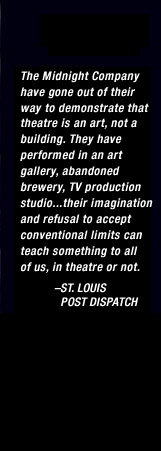THE GREATEST PLAYS YOU'LL NEVER SEE 2
by Joe Hanrahan / June 10, 2023
Greatest Plays You'll Never See ( I ) was inspired by a book which listed the many potentially great films that were in the works but just never made it to the screen. My blog followed that path with Midnight productions that were in the works, but never made it to the stage. (That blog appeared July 24, 2014, if you'd like to check it out.)
Whether you check that one out or not, I’m going to comment on several shows mentioned in that blog. First are a couple that you might have finally gotten to see.
JUDGMENT AT NUREMBERG was a title under discussion and almost ready for production when Midnight’s original ruling class broke up, as Dave Wassilak gravitated toward the new Actors Studio. That was in 2007. But then in 2018, the play finally came to production. We presented it at The Missouri History Museum (we’d worked there very successfully a couple of times - THE BALLAD OF JESSE JAMES (2000) and GIVE ‘EM HARRY (2009). Of course the MHS crowd is just the right audience for these forays into the historical past. And JUDGMENT found it a perfect home as well. There’s plenty to read/reviews/photos etc, on this site, but suffice to say it was a profound and sobering experience, a very satisfying conclusion to the long journey of this play.
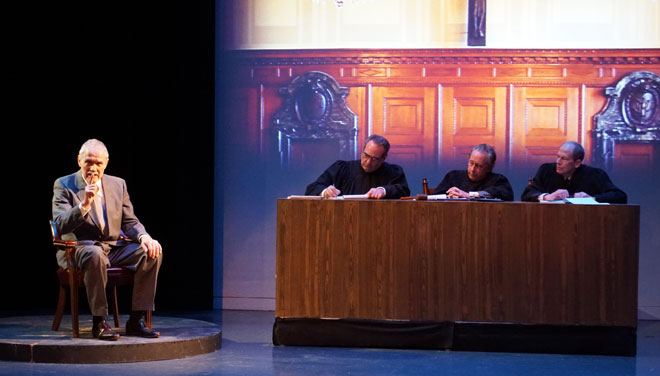
And then in 2009, after several years of denying requests to produce, Will Eno’s TITLE AND DEED was finally offered to Midnight. Along with the condition, “The playwright wants to talk to you.” We had speculated why we weren’t able to get these rights.
Of course, the script was written for an Irishman, who was exploring an outsider/immigrant status as he moved into a new country. The only other folks given the rights were a Chicago troupe, with an actor in a wheel chair doing the role. That cemented the thought that maybe only an outsider, a minority, or some sort would be allowed to tackle the script.
But as we very happily engaged in a few long phone conversations with Will Eno, another thought surfaced. This was his latest play at the time. It’s a very delicate piece, and we conjectured that this was Eno’s “baby” - something he wanted to make sure was handled and presented just right. Apparently our discussions comforted him. We had a wonderful time with the script. More on it in, yes, the Past Productions page.
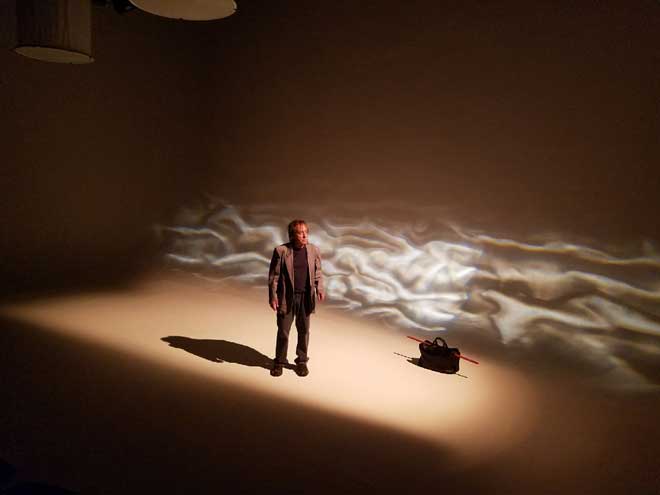
And a further development of a play mentioned in the first version of this was BILL GRAHAM PRESENTS, by Robert Greenfield, based on his biography of the man. (Graham, of course, the two fisted producer of the Grateful Dead and the father of the San Francisco music scene, who went on national productions and tours with some of rock’s biggest acts.)
At the time, Graham’s family, who held the rights, were not willing to let the play happen again. Greenfield didn’t understand, but he had no say in the matter. This play will not resurface (even fewer people have any idea of who Graham was now), but I’ve keep in touch with Greenfield. He recently published a biography of Sam Shepard. While some reviews have criticized the book for skimming along the surface and never really figuring Sam out (as if anybody could), but Greenfield was hampered in his research, as very few Shepard intimates were willing to talk about him. But a good read for all theatre folk, as are Greenfield’s other books on the Rolling Stones (he toured with them), Burt Bacharach and more.
And then there are some of the other GREATEST PLAYS YOU’LL NEVER SEE. After that first column, there was another play I desperately wanted to do. This would have been an original,
titled THUNDER AND LIGHTNING. It was inspired by a concert I saw many years ago, titled aptly enough, The Thunder And Lighting Tour. It featured Joe Cocker (The Thunder) and Stevie Ray Vaughn (The Lightning). I didn’t know Stevie well at the time, I was going to see Cocker, a long time favorite.
The show was on a Sunday evening in August. St. Louis had suffered under 100 degree plus temperatures for over a week. But that Sunday morning, the weather broke, the high was around 72 with no humidity, and the crowd at the concert that night was full of energy and life. It was a great show and I soon became of one Stevie Ray’s biggest fans. I wanted to create a play that took backstage at a show like this. And I wanted to work with my son, Travis, again. I had no doubt he could capture the look and swagger of Stevie, along with maybe just a few licks on the guitar (no one can emulate Vaughn, but Trav was a talented musician along with being a great actor). I would play Cocker, and the show would be the meeting of the deep old time British blues of Joe and the new wave blues rock Texas guitar of Stevie. (The thought was to have a cute young female journalist in the dressing room to interview them - the show would turn into a musical generational debate and maybe a joust for the eye of the girl.)
The desperation to do this show came with the fact that my son, Travis, was in the throes of battling heroin and alcohol addiction. During his last days, I made numerous efforts to engage him in creative projects - either one like this, or paying for the development of one of his film ideas. But we didn’t get there in time. Travis passed. And thus, this is a great play that you will never, ever see.
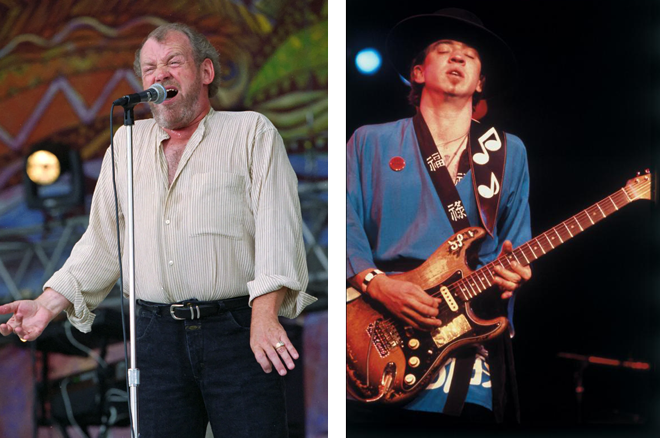
One play I hope we see sometime is HARRY CLARKE by David Cale, a one-man show. (Out of habit, I examine every one-man I come across.) It’s the story of a shy, gay, midwesterner who moves to New York, pretends to be British, and thus starts to make his way through the social and artistic high line of both New York and London. Billy Crudup did the role to great success Off Broadway. I liked the show, but quickly realized I was too old to do the part.
But the play cropped up again. I was looking at another one-man script, THE ABSOLUTE BRIGHTNESS OF LEONARD PELKEY. I talked to my friend Ellie Schwetye about it. She was consulting with New Jewish Theatre about their choices for their upcoming season, and she mentioned they were looking at this script as a vehicle for Will Bonfiglio. I panicked a bit (I was looking hard at Pelkey for my season) and suggested they switch their attention to HARRY CLARKE. They did (they liked it but found nothing really Jewish in the script) and wound up going with EVERY BRILLIANT THING (Will acting, Ellie directing.) I didn’t really see anything Jewish in PELKEY either. But I went ahead and did that show. Good show, fun to do, but speaking of plays you’ll never see, I really don’t think think you’ll see any more one-man shows from this dude.
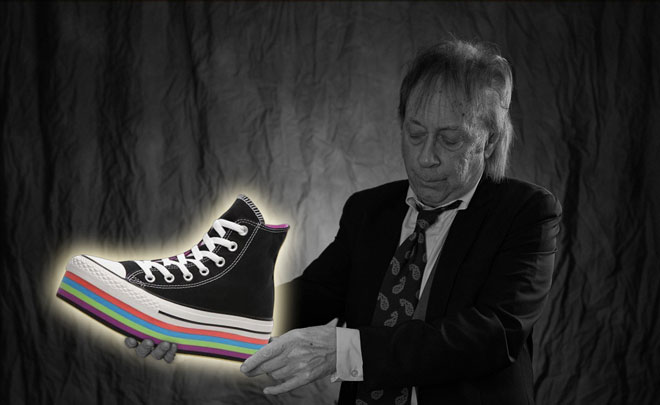
Finally, there’s one of my latest tricks of viewing great documentary films and saying “Hey, this is a play!” I did it with A MODEL FOR MATISSE. And then watched one on Studio 54 (titled the same), and was fascinated. I knew some of the history of the place (and once stood in the back of the enormous crowd that would try to get in there every night), but never really knew the inside story of the two guys who started it - Steve Rubell and Ian Schrager. And I said, “This is a play!”
I would fictionalize the details in my show, but I would make the story a love story between two men. They knew each other attending college in New York City, went off to different pursuits (Rubell restaurants, Schrager law), but then were in the right time and right place (in between the pill and AIDS), with New York City hungering for a new kind of club experience, and went on to build the greatest club the world had ever seen. I knew how I would do this show, recreating the celebrity-packed scene, with Rubell monitoring the crowd. They would self-destruct, of course - tax problems, rampant drug use in the club, and probably some NYC competitive jealousy - and both Steve and Ian would go to jail. But their friendship endured right till the time Rubell succumbed to aids. The show would be called STUDIO - no “54” - STUDIO would be what the insiders called the place. I would recruit a gang of dancers to fill the club and serve in additional roles. I thought the show could be spectacular, with a deep emotional core. But then I learned (through the random Facebook post of an actor who’d been cast) that another local company was doing the musical version of SATURDAY NIGHT FEVER, in the exact time slot I was planning STUDIO. I thought we can’t have two disco shows at the same time, even though I’m sure mine would have been more interesting.
So STUDIO went away and wound up in this blog. (I had a bit of a personal devotion to doing this - after his jail term, Schrager went on to form some of the first, hip boutique hotels around the world, and on business trips, I stayed in several of them in New York and Los Angeles. Great hotels, and great times in them.
P.S. Another documentary I thought about for a stage transfer was one called GOOD OLD FREDA, the story of a young woman who worked for Brian Epstein and The Beatles (heading up their fan club along with office work) for the whole period of their success, from the Cavern in Liverpool (where Freda saw them over a 100 times) right through and past their breakup.
At the time, I was looking for a vehicle for a woman I wanted to work with, doing a Cabaret Theatre show. I thought, this might work - one woman, telling Beatles’ stories, singing their songs. But the problem - Freda was very discreet. That’s why the Beatles liked her. She didn’t tell any stories out of school, so there wasn’t enough of a story for a play. Still, I will continue to keep my eyes out for good documentaries.
|

